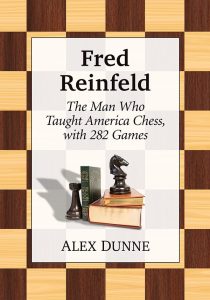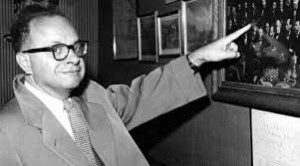
Fred Reinfeld : The Man Who Taught America Chess, with 282 Games : Alex Dunne
FM Alex Dunne

How we all laughed, back in the day. How we all laughed whenever Fred Reinfeld’s name was mentioned. All those books written for patzers. How to Win When You’re Ahead. How to Win When You’re Behind. How to Win When You’re Equal. How to Win With the White Pieces. How to Win With the Black Pieces. How to Win with the Blue Pieces. How to Win with the Yellow Pieces. Well, perhaps we made up some of those titles, but you know what I mean. Endless books of basic, over-simplified instruction, not for the likes of us.
But now, half a century or so on, I’d say that Fred is one of my heroes. A man who brought a lot of pleasure to a lot of people, teaching them the basics so that they could move onto higher level instruction later on if they chose to do so. If they didn’t, no matter: they were still enjoying chess. And he wrote some excellent higher level books as well. A particular favourite of mine was his collection of Tarrasch’s best games: I guess Tarrasch’s logical style suited Reinfeld’s style of annotations.
There was much more to him than chess books, though. In the 1930s, when he was in his 20s, he was one of the strongest players in the USA, numbering Reshevsky (twice), Fine and Marshall among his victims. At the start of 1942 he decided to give up competitive chess and concentrate on writing. It wasn’t just chess books that he wrote, either. His bibliography includes books on checkers, coin and stamp collecting, science, maths and history. He died relatively young, in 1964, at the age of 54. Granted another 20 or 30 years, who knows how many books he would have written.
It’s easy to mock, isn’t it? We can all name authors who decided it would be more lucrative to write bad books quickly than to write good books slowly. but Reinfeld’s books, although for the most part not written for stronger players, were by no means bad. He was an excellent writer and pioneering teacher who developed the ‘solitaire chess’ method of asking questions on a game and awarding points for good answers. It’s hard to disagree that he was one of the most influential figures in mid-20th century chess, and a biobibliography was long overdue.

Sadly, this volume doesn’t really do Reinfeld full justice. The author, Alex Dunne, is an enthusiast rather than an academic historian. It includes 282 games (actually 281, as one game appears with two sets of annotations), mostly played by him, some with notes, either by Reinfeld or by Dunne. You might possibly want more annotations, or you might think that, as Reinfeld was best known as a writer, this doesn’t matter too much.
Dunne also provides, as you might expect, details of Reinfeld’s books, although it’s not always easy to find what you’re looking for. There’s a discussion about whether or not Reinfeld ghostwrote Reshevsky on Chess and Marshall’s My Fifty Years of Chess, but Dunne adds nothing further to what is readily available online and leaves readers to draw their own conclusions. There’s also nothing about Edward Young, generally assumed to be a pen-name of Reinfeld, although the books published under this name are included in the bibliography. (Wikipedia and other online sources claim that Reinfeld also used the pseudonym Robert V Masters, but Dunne tells us, without providing sources, that Masters was actually Sterling Publishing Company President David Boehm.)
Reinfeld produced American editions of various British chess books. I’d have welcomed more information about what, if any, changes were made. To take just one example, he mentions Epic Battles of the Chessboard by ‘Richard Cole’. He might have mentioned that the original title was Battles Royal of the Chessboard, and should certainly have given the author, Richard Nevil Coles, who, for some reason, was usually known by his middle name rather than his excellent first name, his correct surname. ‘R Nevil Coles’ would have been much better. Again, Morphy’s Games of Chess is incorrectly attributed to E Sergeant in the text, but the bibliography correctly identifies the author as Philip Sergeant.
Reverting to the games, some of Reinfeld’s opponents are identified by their first name and surname, others only by their initial and surname. I thought I knew that W Goldwater, for example, was Walter, and it took all of 5 seconds for Mr Google to confirm this.
All in all, then, something of a missed opportunity. A worthy book and a worthy subject, but lacking the rigorous historical research and accuracy we expect from this publisher. I’d like to suggest a group biography of Reinfeld and his occasional co-authors Chernev and Horowitz as a possible project for a US chess historian. Nevertheless, in the absence of anything else, if you’re interested in chess history of this period, chess literature or chess teaching you’ll still want to buy this book.
Here’s one of Reinfeld’s favourite games:
Richard James, Twickenham July 15th 2019

Book Details :
- Hardcover : 194 pages
- Publisher: McFarland (30 October 2018)
- Language: English
- ISBN-10: 1476676542
- ISBN-13: 978-1476676548
- Product Dimensions: 17.8 x 1.3 x 25.4 cm
Official web site of McFarland Books

